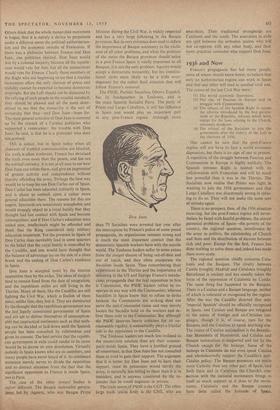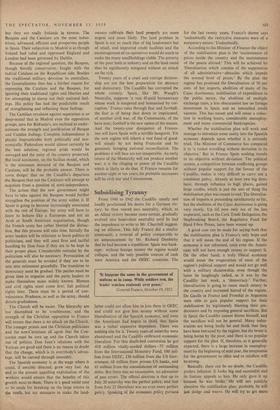1936 and Now
Franco's propaganda has led many people, some of whom should know better, to believe that only an authoritarian regime can work in Spain and that any other will lead to another civil war. The causes of the last Civil War were : (I) The world economic depression.
(2) The rise of Fascism in Europe and its struggle with Communism.
(3) The refusal of the Spanish Right to accept the reforms introduced by the first govern- ment of the Republic, reforms which were, except for the laws relating to the Church, extremely moderate.
(4) The refusal of the Socialists to join the government after the victory of the Left in the elections of 1936.
One cannot be sure that the post-Franco regime will not have to face a world economic depression, but there is no sign of one at present. A repetition of the struggle between Fascism and Communism in Europe is highly unlikely. The Spanish extreme Right is tainted with its collaboration with Francoism and will be much less powerful than it was in the Thirties. The Socialists now realise that Prieto was right in wanting to join the 1936 government and that Largo Caballero was disastrously wrong in refus- ing to do so. They will not make the same sort of mistake again.
There is no prospect, then, of the 1936 situation recurring, but the post-Franco regime will never- theless be faced with fearful problems, the almost perennial problems of Spain—the poverty of the country, the regional question, interference by . the army in politics, the relationship of Church and State and the distribution of income between rich and poor. Except for the first, Franco has done nothing to solve them and indeed has made them more acute.
The regional question chiefly concerns Cata- lonia and the Basques. The rivalry between Castile (roughly Madrid) and Catalonia (roughly Barcelona) is ancient and has usually taken the form of the oppression of Catalonia by Castile. The same thing has happened to the Basques. There is a Catalan and a Basque language, neither of which is tolerated or recognised by the regime. After the war the Caudillo directed that only 'imperial Spanish' should be officially recognised in Spain, and Catalan and Basque are relegated to the status of foreign and un-Christian lan- guages, though it is, of course, rare for the Basques and the Catalans to speak anything else. The centre of Catalan nationalism is the ,Benedic- tine Monastery of Montserrat, and Catalan and Basque nationalism is supported and led by the Church except for the bishops. Some of the bishops in Catalonia do ,not even speak Catalan and wholeheartedly supPort the Caudillo's anti- Catalan policy. The Basque provinces are much more Catholic than any other part of Spain, and both there and in Catalonia the Church's con- nection with the national movements brings to itself as much support as it does to the move- ments. Catalonia and the Basque country have been called the Irelands of Spain, but they are really Irelands in reverse. The Basques and the Catalans arc the most indus- trious, advanced, efficient and prosperous people in Spain. Their subjection to Madrid is as though Ireland had ruled and oppressed England and London had been governed by Dublin.
Because of the regional question, the Basques, though fiercely conservative, fought with the radical Catalans on the Republican side. Besides the traditional military devotion to centralism, the Generalissimo thus has a further reason for repressing the Catalans and the Basques, for ignoring their traditional rights and liberties and for attempting to stamp out their national feel- ings. His policy has had the predictable result of strengthening and inflaming these feelings.
The Castilian revulsion against separatism is so' deep-seated that in Madrid even the opposition groups, save for Ridruejo's, are inclined to under- estimate the strength and justification of Basque and Catalan feelings. Complete independence is plainly impracticable both politically and eco- nomically. Federalism would almost certainly be the best solution; regional pride would be assuaged and the unity of the country preserved. But local autonomy, on the Sicilian model, which is the minimum demand of the Basques and Catalans, will be the probable answer. There is some danger that on the Caudillo's departure the Basques (but not the Catalans) will attempt to negotiate from a position of semi-independence.
The action that the new government might have to take against the Basques would further strengthen the position of the army within it. If Spain is going to become increasingly associated with the rest of Europe, her army will have to learn to behave like a European and not an Arab or South American organisation, though the French army has rather blurred the distinc- tion. But this process will take time. Initially the army leaders will be reluctant to leave politics to politicians, and they will need firm and tactful handling by Don Juan if they are to be kept in their proper place. Considerable restraint by the politicians will also be necessary. Provocation of the generals must be avoided if they are to be sent into retirement gracefully. The transition to democracy must be gradual. The parties must be given time to organise and the party leaders to make themselves more widely known. Human arid civil rights must come first; full political rights later. There must be a period of con- valescence. Prudence, as well as the army, should dictate gradualness.
The Church will be easier. The hierarchy are too discredited to be troublesome, and the strength of the Christian opposition to Franco will ensure that there is no attack on the Church. The younger priests and the Christian politicians and the non-Christians all agree that the Con- cordat must be torn up and the Church taken out of politics. Don Juan's relations with the Vatican are good and there is no reason to doubt that the change, which is to everybody's advan- tage, will be carried through smoothly.
The Spanish economy is at the stage where it could, if sensibly directed, grow very fast. An end to the present appalling exploitation of the workers would ensure that the benefits of this growth went to them. There is a good social case to be made for 'breaking up the large estates in the south, but tax measures to make the land-
owners cultivate their land properly are more urgent and more likely. The land problem in Spain is not so much that of big landowners but of small, and improved credit facilities and the encouragement of co-operatives would do much to make the many smallholdings viable. The poverty of the poor both in industry and on the land could thus be significently mitigated without an attack on the rich.
Twenty years of a cruel and corrupt dictator- ship are not the best preparation for decency and democracy. The Caudillo has corrupted the whole country. Spain, like Mr. Waugh's Neutralia, supports 'a vast ill-paid bureaucracy whose work is tempered and humanised by cor- ruption.' Franco rules through fear and football; the fear is of being shot down or imprisoned, of another civil war, of the Communists, of the have-nots; football is the new opiate of the masses. And the twenty-year dissipation of Franco- ism will leave Spain with a terrible hangover. Yet the new regime will inherit a vast fund of good- will simply by not being Francoist and by genuinely bringing national reconciliation. The problems it will face are not insuperable. An early return of the Monarchy will not produce another war; it is the clinging to power of the Caudillo which is likely to do that. If Franco remains for another eight or ten years, his probable successors will be civil war and Communism.











































 Previous page
Previous page